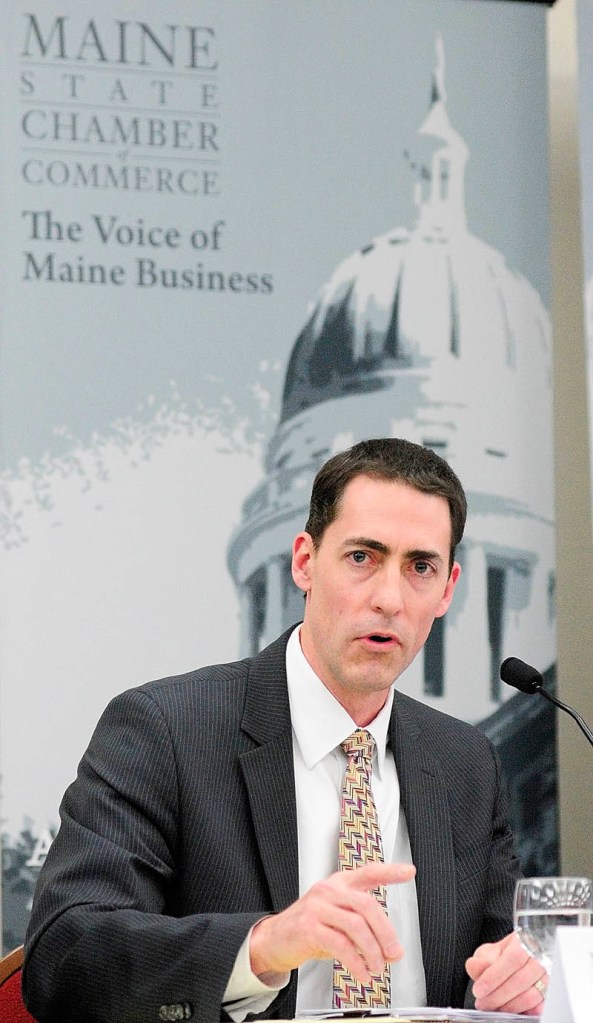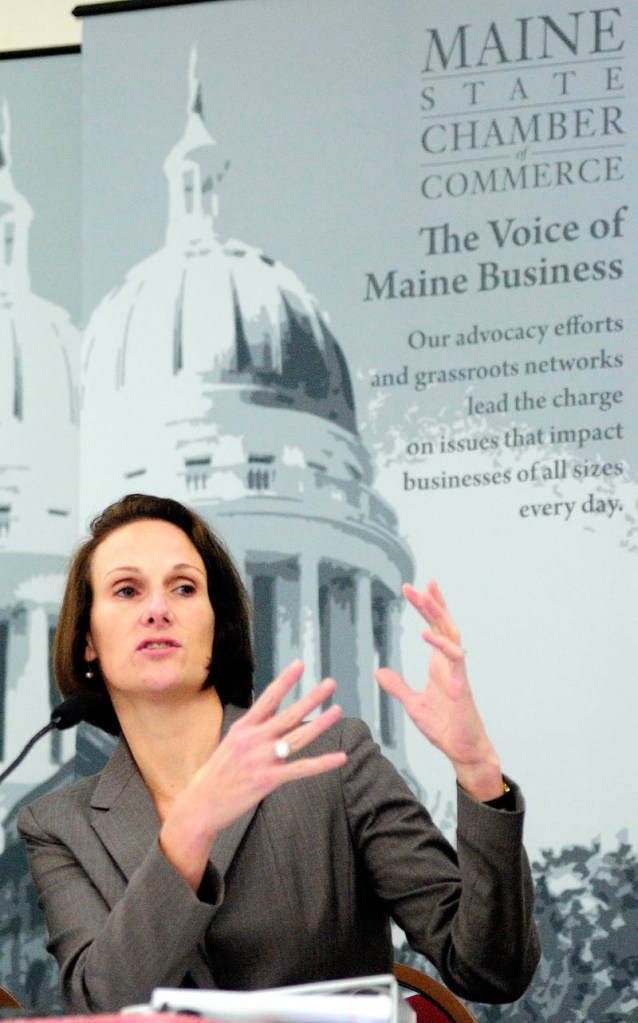AUGUSTA — The federal Affordable Care Act was passed two years ago but uncertainty remains about how the health care reform law will affect individuals and businesses, panelists told more than 100 area employers during a forum Wednesday.
The Maine State Chamber of Commerce hosted the event in an attempt to help solve problems employers might encounter when trying to understand the law and its regulations, many of which will go into effect in the coming years.
All forum speakers emphasized the complicated nature of many rules and the difficulty in understanding what the health care reform means to business owners and employees.
“The reality is the Affordable Care Act is the law of the land” and employers need to know how to navigate it, said Peter Gore, vice president for advocacy and government relations at the chamber, before introducing the speakers at the Augusta Civic Center.
Speakers for the most part agreed that some type of state-run health insurance exchange would be more beneficial for business than leaving the exchange up to the federal government. Gov. Paul LePage, however, has refused to set up a state exchange and won’t allow Maine to take part in the Medicaid expansion that was originally mandated in the law but struck down by the U.S. Supreme Court this summer.
Katie Mahoney, executive director of health policy at the U.S. Chamber of Commerce, said the chamber has supported state-based exchanges when asked but understands that it can be a political hot potato for states. The U.S. chamber has actively lobbied against the federal health reform law, known also as Obamacare.
A small business health options program, also called a SHOP exchange, could be beneficial for employers, said Charles Dingman, health law attorney for law firm Preti Flaherty. Yet it’s unclear what options Maine business owners will have without the state taking action, he said.
“The extent to which employers in Maine will have the ability to affect what the SHOPs look like is going to be significantly reduced if we’re taking whatever the federal government has to offer in that regard,” he said.
The forum’s harshest critic was Joel Allumbaugh, CEO of National Worksite Benefit Group. Allumbaugh said he’s not convinced that the law won’t be a disaster when its provisions are fully implemented in the coming years.
“I seriously question whether the law has the ability to do what it intended to do,” said Allumbaugh, who’s also the director of the Center for Health Reform Initiatives at the conservative Maine Heritage Policy Center.
Most speakers agreed that employers should favor expanding Medicaid eligibility to those with incomes up to 133 percent of the federal poverty level — the overturned mandate — because it would save businesses from having to cover some full-time employees not currently eligible for Medicaid.
Mahoney did point out that this may not necessarily be good for the employees, since the Medicaid insurance plan likely wouldn’t cover as much as a work-sponsored plan.
Allumbaugh called increasing the number of people eligible for Medicaid backwards thinking because he said the system is broken. He said containing the high cost of health care should be the first step.
Mahoney gave an overview of the law from the federal-level perspective and described the slow process of the government rolling out more specific regulations. “I always say we won’t know what’s in it for year’s to come,” she said.
Bill Graham, vice president of policy and government affairs at Harvard Pilgrim Health Care, tried describing what will change for employers once the majority of provisions go into effect in 2014. He also spoke about some options for Maine, including setting up a partnership exchange model for health insurance plans that would have parts run by both state and the federal government.
Graham said he still thinks Maine could implement a state health insurance exchange before the federally-run exchange goes into effect in 2014.
Allumbaugh’s presentation largely focused on problems in the law, including what he said is a failure to tackle the real issue at hand — the rising cost of health care.
He also said that he has done case studies on some businesses showing the employers would save money if they took the penalty for not offering health insurance rather than paying for their employees’ plans.
“I actually think that an alarming number of companies are just going to stop offering health insurance,” he said.
Neither Graham nor Mahoney shared Allumbaugh’s views that the law will cause large numbers of employers to drop their employees’ health insurance coverage.
Graham said this didn’t happen in Massachusetts after the state passed similar health care reform in 2006.
“Our experience there is that our employers did not get out of the coverage game in large numbers,” he said. But he did acknowledge that there are some differences in the laws and the country’s economy when both were passed.
Mahoney said the law will affect different size and types of businesses in different ways. Some businesses with older employees may benefit from the law, while businesses with a younger work force could incur higher costs, she said.
One possible consequence is the law could encourage businesses to make full-time employees part-time to avoid having to buy insurance, Mahoney said.
“That would be a very sad repercussion in this economy,” she said.
Sen. Tom Saviello, R-Wilton, who attended the presentation, said it was a helpful look at what the law contains. Unlike most Republicans, Saviello voted in favor of the state health insurance exchange in April.
But Saviello said he thinks the provisions in the entire law will be more costly than most people expect, for both individuals and the government.
“Conceptually I’m not against it, but the devils are in the details,” he said.
Paul Koenig — 621-5663
pkoenig@mainetoday.com
Send questions/comments to the editors.



